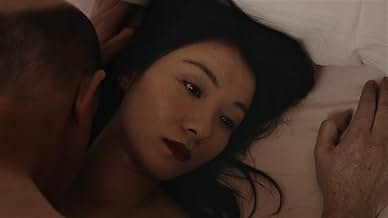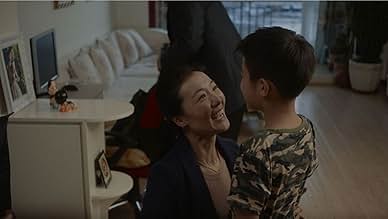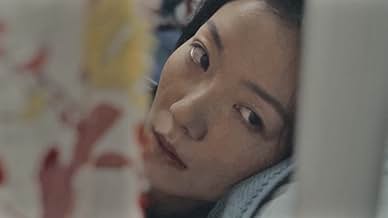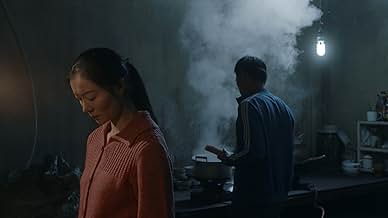NOTE IMDb
6,9/10
257
MA NOTE
Lina, née en Chine, s'installe à Paris pour économiser de l'argent pour poursuivre ses rêves d'entreprise, laissant derrière elle son mari et son fils dans la province de Dong Bei. Mais une ... Tout lireLina, née en Chine, s'installe à Paris pour économiser de l'argent pour poursuivre ses rêves d'entreprise, laissant derrière elle son mari et son fils dans la province de Dong Bei. Mais une fois en Europe, rien ne se passe comme prévu.Lina, née en Chine, s'installe à Paris pour économiser de l'argent pour poursuivre ses rêves d'entreprise, laissant derrière elle son mari et son fils dans la province de Dong Bei. Mais une fois en Europe, rien ne se passe comme prévu.
- Récompenses
- 1 victoire et 5 nominations au total
Chloe Maayan
- Dandan
- (as Meihuizi Zeng)
Étienne Ménard
- Client #1
- (as Etienne Menard)
Sâm Mirhosseini
- Client #3 - Roumain
- (as Sam Mirhosseini)
Histoire
Commentaire à la une
'Les fleurs amères' (the title in the English distribution is 'Bitter Flowers') is the debut feature film of Belgian director Olivier Meys. It's also his only film so far, but I sincerely hope there will be more, because Meys demonstrates here both courage in tackling difficult themes, competence in assembling an unusual international team and talent in creating believable characters and situations on screen, which reflect real problems of the world in which we live. The director lived for many years in China and has experience as a documentary filmmaker with films made there during the period of great transformations that this country went through after the year 2000. 'Les fleurs amères' uses this life experience and decants it into a film also located at the intersection of the two cultures (Chinese and Western), with a story in which the often difficult experience of Chinese economic emigrants who came to work illegally in Europe is presented from the opposite point of view to that which European viewers are used to. Avoiding the pitfalls of melodrama and propaganda, Meys brings dramatic and believable characters and events to the screen.
The main heroine of the film, Lina, is an intelligent and hard-working woman, married and the mother of a ten-year-old boy, who decides to go to work for a few years in France as a nanny to get out of the economic impasse of the family, which lives in an area of China where industry has fallen into ruin. Once she arrives in Paris she will discover, as many other economic immigrants did, that the European reality is very different from expectations. In addition, the language and appearance barrier and the illegal status isolate her in the Chinese-speaking community. She finds support only in a group of immigrant women like her, forced to prostitute themselves to survive. Lina, after many tentatives and hesitations, joins them, and manages to recover financially. The price paid by this compromise, however, is huge and endangers not only her social status and her family life when she returns to China, but also her self-respect.
The relationship between the West and China is very complex these days, and 'Les fleurs amères' addresses a facet not explored (as far as I know) in films. We know the theme of immigration, including illegal immigration and its sordid and violent aspects from other films, but most of them are about immigrants from Eastern Europe or Africa. Although Olivier Meys is Belgian, the film is made from the Chinese perspective, addressing aspects related to the complex issues of the huge population migration (part internal, but also external as we can see in the film) that has taken place in China for the last four decades. Meys probably has the freedom to explore aspects and say things that Chinese filmmakers could not express. What impressed me though is the style and atmosphere, which retains the human empathy and solidarity of the characters in many Chinese films. The lead role is played by Xi Qi, a formidable actress, whose emotions transcend the screen and impress with dignity and sensitivity. Wang Xi plays her friend, in whom she finds moral support in the worst moments of trouble. Finally, the trio of strong female characters is completed by the younger Chloe Maayan who plays the role of Lina's sister-in-law, arrived later in Paris, attracted by the mirage of the heroine's supposed success. The cinematography belongs to Benoît Dervaux, an experienced Belgian filmmaker, who contributes to the special atmosphere of the film, whose action takes place partly in Paris, partly in China. Even when filming in Paris, the camera seems closed in the social bubble in which the heroine lives, that of the Chinese community in the French capital. We see, sometimes in the background, monuments and landscapes that we know, but it is as if they are seen from the inside through a glass wall. Scenes filmed in China add to the picture of a changing world and capture the moral and social implications of the events that had taken place in France. Both Meys and Dervaux have backgrounds and experience as documentarians, and it shows. The camera is mobile, part of the actors are amateur. Although the characters and the plot are imaginary, 'Les fleurs amères' looks like a docu-drama. A powerful and impressive one.
The main heroine of the film, Lina, is an intelligent and hard-working woman, married and the mother of a ten-year-old boy, who decides to go to work for a few years in France as a nanny to get out of the economic impasse of the family, which lives in an area of China where industry has fallen into ruin. Once she arrives in Paris she will discover, as many other economic immigrants did, that the European reality is very different from expectations. In addition, the language and appearance barrier and the illegal status isolate her in the Chinese-speaking community. She finds support only in a group of immigrant women like her, forced to prostitute themselves to survive. Lina, after many tentatives and hesitations, joins them, and manages to recover financially. The price paid by this compromise, however, is huge and endangers not only her social status and her family life when she returns to China, but also her self-respect.
The relationship between the West and China is very complex these days, and 'Les fleurs amères' addresses a facet not explored (as far as I know) in films. We know the theme of immigration, including illegal immigration and its sordid and violent aspects from other films, but most of them are about immigrants from Eastern Europe or Africa. Although Olivier Meys is Belgian, the film is made from the Chinese perspective, addressing aspects related to the complex issues of the huge population migration (part internal, but also external as we can see in the film) that has taken place in China for the last four decades. Meys probably has the freedom to explore aspects and say things that Chinese filmmakers could not express. What impressed me though is the style and atmosphere, which retains the human empathy and solidarity of the characters in many Chinese films. The lead role is played by Xi Qi, a formidable actress, whose emotions transcend the screen and impress with dignity and sensitivity. Wang Xi plays her friend, in whom she finds moral support in the worst moments of trouble. Finally, the trio of strong female characters is completed by the younger Chloe Maayan who plays the role of Lina's sister-in-law, arrived later in Paris, attracted by the mirage of the heroine's supposed success. The cinematography belongs to Benoît Dervaux, an experienced Belgian filmmaker, who contributes to the special atmosphere of the film, whose action takes place partly in Paris, partly in China. Even when filming in Paris, the camera seems closed in the social bubble in which the heroine lives, that of the Chinese community in the French capital. We see, sometimes in the background, monuments and landscapes that we know, but it is as if they are seen from the inside through a glass wall. Scenes filmed in China add to the picture of a changing world and capture the moral and social implications of the events that had taken place in France. Both Meys and Dervaux have backgrounds and experience as documentarians, and it shows. The camera is mobile, part of the actors are amateur. Although the characters and the plot are imaginary, 'Les fleurs amères' looks like a docu-drama. A powerful and impressive one.
Meilleurs choix
Connectez-vous pour évaluer et suivre la liste de favoris afin de recevoir des recommandations personnalisées
- How long is Bitter Flowers?Alimenté par Alexa
Détails
- Date de sortie
- Pays d’origine
- Sites officiels
- Langues
- Aussi connu sous le nom de
- Bitter Flowers
- Lieux de tournage
- Sociétés de production
- Voir plus de crédits d'entreprise sur IMDbPro
Box-office
- Budget
- 2 000 000 € (estimé)
- Durée1 heure 35 minutes
- Couleur
- Rapport de forme
- 2.35 : 1
Contribuer à cette page
Suggérer une modification ou ajouter du contenu manquant

Lacune principale
By what name was Les Fleurs amères (2017) officially released in Canada in English?
Répondre























